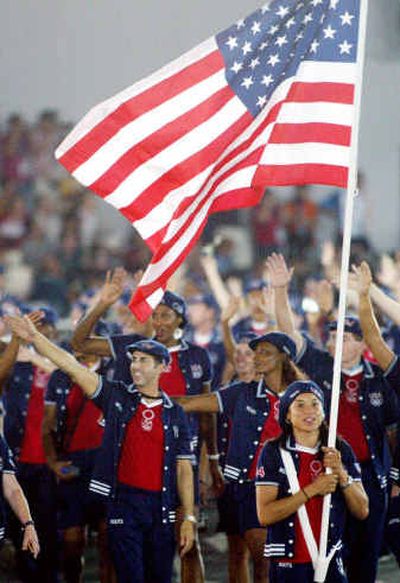Olympic Games go home again

ATHENS, Greece – In a vivid display of color and humanity, the 2004 Summer Games opened Friday night with athletes from 202 nations marching in a joyous procession that traced the path of Greek and human history – one that, for the moment, soothed years-long concerns about Olympic security as well as local outrage over a sudden doping scandal.
Most of the 10,500 athletes set to compete here paraded into Olympic Stadium to open the first Summer Games since the Sept. 11, 2001, terrorist attacks and the U.S.-led war on Iraq. Amid massive security, the event went off with no evident problems.
“Welcome to a unique Olympic homecoming!” said Gianna Angelopoulos-Daskalaki, head of the Athens 2004 organizing committee, signaling the return of the Olympics to the nation where they began, 2,780 years ago in ancient Olympia.
The nearly four-hour ceremony featured some 8,000 entertainers, among them a DJ and actors portraying the goddess Athena, the patron of Athens, as well as Aphrodite, Eros, Zeus and other mythical figures.
An infield pond served as the focal point of the half-hour cultural sequence: The Olympic rings were set aflame atop it; a young boy sailed across it; a centaur – the mythical half-man, half-horse – flung a lightning bolt over it; an olive tree rose skyward from it.
Then came the parade of nations, with Greece positioned both at the front of the line – a tradition arising from its historic role in the ancient and modern Games – and bringing up the rear as host.
The rich pageant featured stars and dreamers sporting suits and skirts, berets and olive wreaths, Bermuda shorts and red-checked headdresses, even a tie-dyed sarong – worn by Sam Pera, a weightlifter who carried the flag for the Cook Islands, a remote Pacific atoll.
The U.S. team, the largest delegation with 538 athletes, was greeted with resounding applause from the crowd of 70,000. Iraq’s 25 athletes were met with a huge roar. So were the Chinese, led into the stadium by the tallest flag-bearer, Houston Rockets’ star Yao Ming.
Holding hands, competitors from North and South Korea entered together, reprising the joint Korean march first undertaken four years ago at the 2000 Summer Games in Sydney.
Some members of the Turkish team waved Greek and Turkish flags. The Greeks, 443 strong and last into the stadium, were met with a standing ovation and flashing lights, many of the athletes dancing as the crowd chanted “Hellas! Hellas!”
Investigation launched
Absent from the Greek contingent were sprinters Costas Kenteris and Katherina Thanou, Olympic medalists at Sydney, who had missed a doping test in the Olympic Village. Hours later, the pair were then reportedly admitted to a suburban Athens hospital after they said they’d been in a motorcycle accident. The International Olympic Committee launched an investigation into the matter, which left many here shocked and saddened.
Kenteris, a national hero, had been a likely candidate to light the Olympic cauldron. Instead, the task was performed by Nikolaos Kaklamanakis, a 1996 gold-medalist in windsurfing, who concluded the global torch relay that began March 25 in Olympia. As the sea of athletes parted to let him through the infield, Kalamanakis ran up a flight of stairs and touched the flame to the Olympic cauldron, which ignited without hesitation and swung smoothly into position.
For the next 16 days, some 10,500 athletes will compete in 28 sports for 300 medals. The 202 nations are more than take part at the United Nations General Assembly; 86 of the 202 have never won an Olympic medal. For the athletes of many nations, the opening ceremony traditionally marks a high point of the Games.
Security for the event was pervasive, as it is throughout Athens and the outlying sports venues, with 70,000 Greek police and military authorities on alert for any irregularity after years of anxiety worldwide related to the 2004 Games.
The 2004 Games arrive after seven years of preparation that, time and again, underscored the cultural touchstone the Summer Games have become.
Greece was awarded the Games in 1997, the IOC intrigued by the notion of returning the Games to the nation of their origin, and – after the commercialism that drew criticism at the Atlanta Games of 1996 – to the ideals that have long moved the Olympic cause.
The Games were first held in Olympia in 776 B.C. The modern Olympics were first staged in Athens in 1896, in all-marble Panathinaikon Stadium.
At these Olympics, the archery events will be held at Panathinaikon. The men’s and women’s marathon will finish at Panathinaikon as well – after starting in Marathon, 26.2 miles away. The men’s and women’s shot put will be held at Olympia on Wednesday, the first time women will ever have competed on the ancient grounds.
In Thessaloniki, almost everyone elected to watch the opening ceremony at home, if they watched at all. Stores and restaurants in Greece’s second-largest city were closed for the three-day holiday, and few people were out on Friday night.
Some tavernas stayed open on cobbled streets at Katouni, leading down to the harbor, and their owners set up television sets amid the sidewalk chairs and tables, but none attracted more than a handful of people, and at some it was only the staff standing around watching the ceremony. Reaction was muted, with no cheers and no boos.
At Olympic Stadium, members of the American team sounded caught up in the moment.
“I really felt the passion and the dream,” diver Laura Wilkinson, a gold medalist at Sydney, said in a television interview.
And Rulon Gardner, the Sydney gold medalist in the super-heavyweight division in Greco-Roman wrestling, said, “Now we’re here in Athens to have some fun.”
Whether they have that fun depends in large part on the Games going off without incident. IOC President Jacques Rogge was asked this week if he believed the $1.5.billion security plan would forestall trouble.
“Come back to me,” he said, “on the 29th of August.”